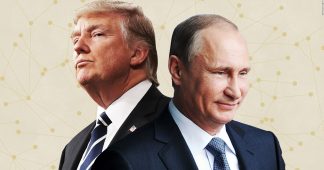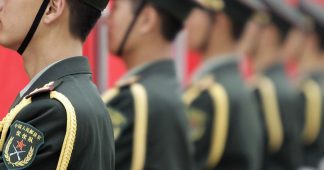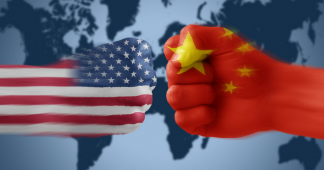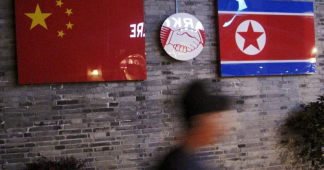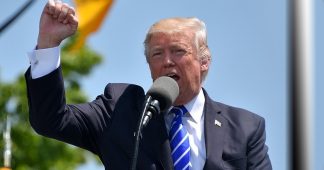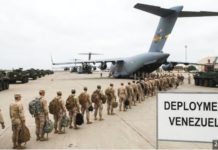By Nick Beams
22 September 2018
In a significant escalation of global tensions, the US has imposed sanctions on a Chinese military unit and its director for purchasing military equipment from Russia’s main arms exporter Rosoboronexport, in contravention of a unilateral ban imposed by Washington in 2017.
China has retaliated against the measure by cancelling trade talks and a top level visit to Washington by Vice-Premier Liu He scheduled to take place next week.
Announcing the ban imposed on Thursday, the US State Department said China’s Equipment Development Department and its director Li Shangfu had made a “significant transaction” involving the purchase of Su-35 combat aircraft in 2017 and S-400 missiles in 2018.
The purchases were declared by the US to be in contravention of the 2017 Countering America’s Adversaries Through Sanctions Act, legislated in response to alleged Russian interference in the 2016 US elections.
State Department spokeswoman Heather Nauert said the sanctions on the Chinese military unit were invoked to “further impose costs on the Russian government in response to its malign activities.” The US would continue to urge all countries to curtail relationships with the Russian intelligence and defence sectors “both of which are linked to malign activities worldwide.”
China’s foreign ministry lodged what were described as “stern complaints” with Washington over the US actions, which block the military agency from conducting transactions with the US financial system.
Foreign Ministry spokesman Geng Shuang said the US actions had “violated the basic norms of international relations and seriously damaged the relations between the two countries.”
Shuang told a press briefing: “China is strongly outraged by this unreasonable action by the US. We strongly urge the US to immediately correct its mistakes and revoke the so-called sanctions. Otherwise, it must take all the consequences.”
Responding to the decision to hit the Chinese military unit and a separate move to add 33 Russians to a US blacklist, Sergei Ryabkov, Russia’s deputy minister of foreign affairs, said the sanctions had been turned into a kind of “national entertainment” and were futile.
Then, in a significant escalation of his language, he continued: “No one will ever succeed in dictating their own terms to Russia. Operators of the Washington sanctions machine are advised to at least superficially familiarise themselves with our history in order to stop wasting their time. Playing with fire is stupid, because it can become dangerous.”
The imposition of the new round of sanctions came at the end of a week which saw a significant increase in both economic and geo-political conflicts.
On Monday, the US announced the imposition of a 10 percent tariff on $200 billion worth of Chinese goods, with the rate to increase to 25 percent in January next year, in a major escalation of its trade war measures.
The dominant faction in the Trump White House, led by US Trade Representative Robert Lighthizer and economic adviser Peter Navarro, insist the measures are necessary on “national security” grounds to counter China’s efforts to expand its industrial and technological base, which they regard as a threat to US economic hegemony and ultimately military supremacy.
Last week, Chinese troops participated in Russia’s largest war games since 1981. It was the first time that forces from a country outside the former Soviet Union have taken part and an indication that Russia and China, despite the differences between them, feel the need for closer cooperation in the face of growing US belligerence.
The steady move towards the fracturing of the world into rival camps was underscored by remarks from Alexander Sherin, the deputy chairman of the defence committee in Russia’s lower house of parliament.
Sherin stated: “Every time Trump makes statements in relation to such serious countries that have a population of more than one billion people, countries that possess nuclear weapons, he only pushes those countries closer to each other. Thanks to US actions, the Russian Federation is forging an even closer relationship with China, India, Turkey and Iran.”
Turkey, a NATO ally of the US, has indicated it is looking to purchase the same S-400 surface-to-air missiles which were the subject of the US action against China, raising the prospect that it could be subject to sanctions if it defies US pressure and goes ahead.
Kremlin spokesman Dmitry Peskov pointed to an economic dimension of the US sanctions, saying they were an attempt to “unfairly and dishonestly hurt” the Russian arms industry which was a “super-competitor” of US corporations.
The US is able to use the sanctions whip to enforce its interests because of the dominant role the dollar plays in the international financial system. This means that countries and corporations that defy its dictates can be severely impacted, even if they do not have significant dealings in the US itself, because financial sanctions hit their global operations.
This is now leading to a push back and the search for ways of developing the means for trade and financial transactions to occur without resort to the US currency.
So-called de-dollarisation was a major subject of discussion at the Eastern Economic Forum held in Vladivostok earlier this month. The summit was attended by delegations from more than 60 countries, including representatives of major corporations from Russia, China and Japan.
The European Union is also looking to alternatives to the dollar in response to the upcoming US sanctions against European firms that continue to deal with Iran after November 4.
Earlier this month, in his State of the European Union address, European Commission President Jean-Claude Juncker called for measures to ensure that the euro played a greater role in international transactions.
With the upcoming US ban on purchases of Iranian oil clearly on his mind, he said: “It is absurd that Europe pays for 80 percent of its energy import bill—worth 300 billion euros a year—in US dollars when only roughly 2 percent of our energy imports come from the United States.”
Responding to the latest US sanctions yesterday, Russian Foreign Minister Sergei Lavrov said they “discredit the dollar system” and Russia would avoid using the US currency for trade. “More and more of our partners in Asia and Latin America are beginning to come to the same conclusion,” he said.
The push back against Washington’s use of the enormous financial power provided to it by the international role of the dollar is leading to a slide towards one of the most significant developments of the 1930s: the formation of rival trade and currency blocs that played a major role in creating the conditions for the outbreak of World War II.
Published at www.wsws.org/en/articles/2018/09/22/chin-s22.html
